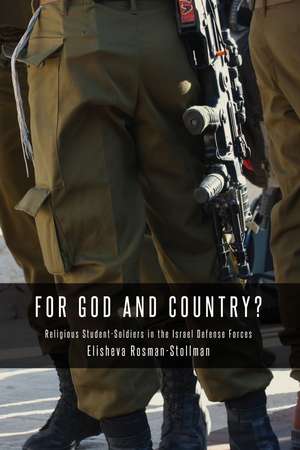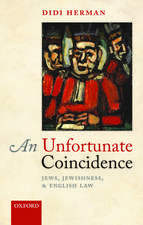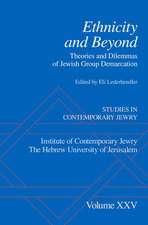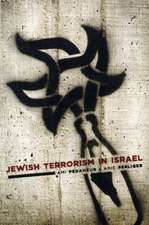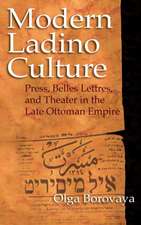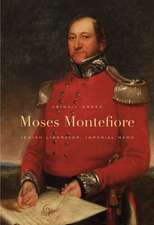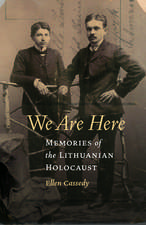For God and Country?: Religious Student-Soldiers in the Israel Defense Forces: Binah Yitzrit Foundation Series in Israel Studies
Autor Elisheva Rosman-Stollmanen Limba Engleză Paperback – 15 mai 2015
For God and Country? focuses on the pre-service study programs available to religious conscripts. Many journalists and scholars in Israel are suspicious of the student-soldiers who participate in these programs, but in fact, as Rosman’s research demonstrates, the pre-service study programs serve as mediating structures between the demands of Religious Zionism and the demands of the Israel Defense Forces and do not encourage their students to disobey orders. This was especially apparent during the disengagement from Gaza in 2005. Many in Israeli society predicted student-soldiers would defy their orders, per the instruction of their religious leaders, but this did not happen as expected. In high profile cases such as this and in matters encountered daily by religious soldiers—the mixing of the sexes, for instance—Rosman has discovered that the pre-service study programs can successfully serve as agents of civil society, both able to curb the military’s efforts to meddle in civilian affairs and vice versa.
Preț: 241.02 lei
Nou
Puncte Express: 362
Preț estimativ în valută:
46.12€ • 48.27$ • 38.39£
46.12€ • 48.27$ • 38.39£
Carte tipărită la comandă
Livrare economică 31 martie-14 aprilie
Preluare comenzi: 021 569.72.76
Specificații
ISBN-13: 9780292758520
ISBN-10: 0292758529
Pagini: 320
Dimensiuni: 152 x 229 x 22 mm
Greutate: 0.47 kg
Editura: Ctr for Middle Eastern Studies UT-Austin
Colecția Ctr for Middle Eastern Studies UT-Austin
Seria Binah Yitzrit Foundation Series in Israel Studies
ISBN-10: 0292758529
Pagini: 320
Dimensiuni: 152 x 229 x 22 mm
Greutate: 0.47 kg
Editura: Ctr for Middle Eastern Studies UT-Austin
Colecția Ctr for Middle Eastern Studies UT-Austin
Seria Binah Yitzrit Foundation Series in Israel Studies
Notă biografică
Elisheva Rosman is Assistant Professor of Political Studies at Bar-Ilan University and a founding member of the Association of Civil-Military Scholars in Israel.
Cuprins
- Introduction
- Part 1. Structures and Institutions
- Chapter 1. Greedy Institutions, Mediating Structures, and Empirical Examples
- Greedy Institutions and Mediating Structures
- Religion and the Military as Greedy Institutions
- Chapter 2. Military Attitudes toward Religious Soldiers: Five Case Studies
- The Iranian Armed Forces
- The Turkish Military
- The United States Military
- The Indian Armed Forces
- The International Context and the Israeli Case
- Chapter 1. Greedy Institutions, Mediating Structures, and Empirical Examples
- Part 2. Being a Soldier and a Religious Jew: Dilemmas and Solutions
- Chapter 3. Military Service from Ideological, Halakhic, and Value Perspectives
- Halakhic and Practical Problems during Military Service
- A Collision of Values
- Issues of Identity
- Chapter 4. The Hesder Yeshivot
- The Nature and Structure of the Hesder Program
- Program Characteristics and Military Service as a Hesder Student
- Curriculum and Faculty
- Preparation for Military Service
- Demographics
- Student Expectations
- Military Service in the Hesder Program
- Contact between the Hesder Yeshiva and Students in the Military
- Chapter 5. The Shiluv Program
- The Nature and Structure of the Shiluv Program
- Program Characteristics and Military Service as a Shiluv Student
- Curriculum and Faculty
- Preparation for Military Service
- Demographics
- Student Expectations
- Military Service in the Shiluv Program
- Contact between the Shiluv Program and Students in the Military
- Chapter 6. The Mekhinot: Preservice Preparatory Seminaries
- The Nature and Structure of the Mekhinot Program
- Curriculum and Faculty
- Preparation for Military Service
- Demographics
- Student Expectations
- Military Service after Studying in the Mekhina
- Contact between the Mekhinot and Students in the Military
- Chapter 7. The Gar’inim Program: Jewish Orthodox Women and the IDF
- Religious Zionist Women, Torah Studies, and Military Service
- The Beginning of the Women’s Gar’inim Program
- The Nature and Structure of the Gar’inim Program
- Curriculum and Faculty
- Preparation for Military Service
- Demographics
- Contact between the Midrasha and Students in the Military
- Student Expectations
- Chapter 8. Mediation in Practice
- Coed Service: Ha-Shiluv Ha-Ra’ui
- Disobeying Orders for Ideological Reasons
- Disbanding Hesder Units
- Chapter 9. Problems for Individual Religious Soldiers during Military Service
- Halakhic Problems during Military Service
- Erosion in the Observance of Mitzvot
- Feelings toward the Military Environment
- Strategies in Problem Solving
- Chapter 10. Senior and Junior Officers’ Views on the Study Programs
- Chapter 11. Mediation as Communication: The Programs’ Role in Conveying Messages between Students and Superstructures
- Messages Communicated by Students through the Study Programs
- Messages Communicated to Students through the Study Programs
- Tensions between the Programs
- Chapter 3. Military Service from Ideological, Halakhic, and Value Perspectives
- Part 3. Summaries and Conclusions
- Chapter 12. Study Programs as Mediating Structures
- Uses of Mediation
- Multidimensional Mediation
- The Contribution of Mediating Structures in the Israeli Case
- The Limits of Mediation: When Mediating Structures Fail
- Chapter 13. Comparisons and Conclusions
- Theoretical Implications
- Implications for General Civil-Military Relations
- Understanding Civil-Military Relations in Israel
- Chapter 12. Study Programs as Mediating Structures
- Methodological Appendix
- Glossary
- Notes
- Bibliography
- Index
Recenzii
This highly original and sophisticated study goes far beyond traditional two-dimensional descriptions of ideologies to uncover how religion fits in with other elements of society. . . . It is not often that a book based on the methodologies of political science is so useful to students of religion. In this case, it can offer a starting point for similar studies in different contexts. This is a fascinating study . . . both path breaking and profound.
Descriere
Challenging conventional assumptions about religious believers, this study reveals how religious student-soldiers negotiate the sometimes conflicting goals and norms of their Orthodox Jewish faith and the Israel Defense Forces in which they serve.
